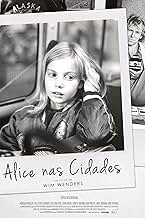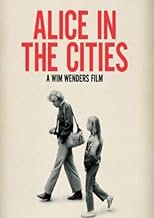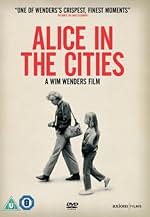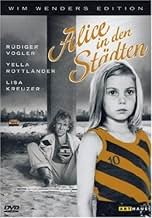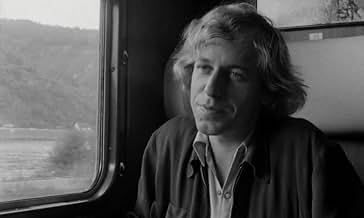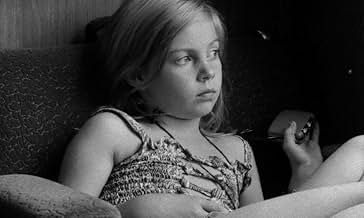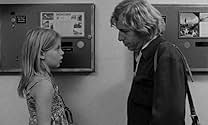Un periodista alemán se hará cargo de una niña de nueve años tras conocer a su madre en el aeropuerto de Nueva York.Un periodista alemán se hará cargo de una niña de nueve años tras conocer a su madre en el aeropuerto de Nueva York.Un periodista alemán se hará cargo de una niña de nueve años tras conocer a su madre en el aeropuerto de Nueva York.
- Dirección
- Guionistas
- Elenco
- Premios
- 1 premio ganado y 1 nominación en total
- Lisa van Damm
- (as Elisabeth Kreuzer)
- Young Girl on Ferry
- (sin créditos)
- Chuck Berry
- (material de archivo)
- (sin créditos)
- Man Looking at Monitor in New York Airport
- (sin créditos)
- …
- Man at Chuck Berry concert
- (sin créditos)
- Organist at Shea Stadium
- (sin créditos)
- Woman Behind Philip and Alice on Plane
- (sin créditos)
- Man on Empire State Building Roof
- (sin créditos)
- Dirección
- Guionistas
- Todo el elenco y el equipo
- Producción, taquilla y más en IMDbPro
Opiniones destacadas
If there are movies, like comedies and horror films, that are better seen in a crowd, there are some movies that might be best seen alone. This is one of them, and I didn't realize until I was almost done because it had become so absorbing I was really enjoying my isolation within the movie.
The plot is simple, and I won't say how it happens, but a nine year old Dutch-German girl is left with a German man in the United States, and he takes care of her as they search for a way to find her mother or grandmother. Their first step is to fly back to Amsterdam, and then in Germany in a little car they poke around looking for her home.
It's a road movie, though unlike any other. The two main characters are about as perfect and as natural as it gets. The man is a thoughtful, drifting writer and photographer, an artist in the counter-culture way of the times. He has no real ambition, but observes the world with poetic appreciation. So when this girl is made part of his life, he takes it in stride. That's key to the mood of the film, that this very unlikely situation can continue for so long because he just goes with the flow. There is no running to the police, no panic. But there is no sense either that this is an accepted new relationship. It's for the moment, but the end of the moment is continually deferred.
The girl goes with the flow as well, and is as brilliant as the man at being natural in front of the camera, often doing nothing. She's made to be lovable, of course, but not in any coy or sentimental way. (If this were a Hollywood film we'd all be barfing by now.) All of this matters because it isn't what's happening that really matters, but it's just being together, the two of them, and then (you realize) the three of you. You wish it was you who was doing this utterly humane, deeply felt act of traveling and being supportive and seeing modern (1973) Germany.
The filming is simple black and white but brilliantly effective, down to the heart wrenching last shot (which was probably the most expensive). The setting is actually a surprise in that you never think of the ordinary middle class and industrial parts of middle Europe being so interesting. The music comes and goes, and refers to the earthy music of the time, mostly American blues based stuff.
In a little way this reminded me of "Stranger than Paradise" and when I connected the two I saw how much Jarmusch (in that film) owed to these art film experiments just a few years earlier. And now that I think of it, this one is more touching and important even if "Stranger than Paradise" is more inventive. "Alice in the Cities" makes a case for a kind of film we don't see being made now, and which might have another vogue one of these years in reaction to the general highly refined, highly artificial worlds of most movies today. I hope so.
It's very entertaining for the charm of the characters, especially Yella Rottländer as Alice. She shines here as a very self-possessed, precocious youngster who disrupts the life of the familiar, detached, angst-ridden protagonist, Philip (Rudiger Volger).
There are small details captured in this film that are noteworthy to fans as well as casual viewers. The old organ at Shea Stadium (long since removed) is briefly shown in one early scene . The monorail in Wüppertal is featured in another sequence (one of the first monorails built). There is a lot of urban decay documented in their travels, particularly in the Ruhr district scenes but all of that can't detract from the humor of the 2 lead characters' playful interactions. The shot of Philip and Alice mimicking each other doing calisthenics offsets all the dreariness and alienation in one scene. The optimistic ending is a very satisfying one. This is a beautiful gem of a film if you can find it.
"Alice in the Cities" is the first of three consecutive films by Wim Wenders about the open road, each starring Rüdiger Vogler as a similar, if not identical character. The second, "The Wrong Movement" (Falsche Bewegung) (1975), is an incredibly difficult slog of total human alienation. The third, and much better than the second film, "Kings of the Road" (Im Lauf der Zeit) (1976) is similar to this one, as Mr. Winter continues his journeys through the German countryside.
This is a film about childhood relationships - not those we have with our peers, but those of a greater age. This makes perfect sense to me, as I would without fail seek out the company of an adult over the fleeting fancies of ones closer to me. To me, anything past fully grown would blur together, all except for the very old. Philip isn't comfortable with children, just as I have become over time. It is a hallmark of those who feel that they have never outgrown their own childhood, who feel so lost inside the adult world that the past feels foreign to a present that will never fit. Their belief that living in the future is futile keeps them grounded in today, their only salvation from a life spent dreaming.
Reality is harsh in "Alice in the Cities". The release comes where life lives. The precious and precocious sensation of human interaction runs like a vein through the center of everything. This is a story suitable for anyone, not because it holds back, but because it is all in. In love with the very same world it fears, holding the hands of the same dream on whose feet it steps on. Like we all do in life. This film feels exactly like those first two or three years of your earliest memories. If you let it, you'll be taken further back than you'd have ever imagined.
¿Sabías que…?
- TriviaThe novel "Tender is the Night" by F. Scott Fitzgerald is seen on the coffee table of Phil Winter's girlfriend. A character in the novel, Rosemary Hoyt, was inspired by Fitzgerald's affair with actress Lois Moran, who appears in this film as an airport hostess. It was Moran's last movie.
- ErroresCrew are reflected in the side of the car (at around 46 mins - sound man, microphone and other crew. This is why so many cars in movies appear dirty or have a matte paint job.).
- Citas
Lisa - Alice's Mother: What are you writing?
Philip 'Phil' Winter: The inhuman thing about American TV is not so much that they hack everything up with commercials, though that's bad enough, but in the end all programmes become commercials. Commercials for the status quo. Every image radiates the same disgusting and nauseated message. A kind of boastful contempt. Not one image leaves you in peace, they all want something from you.
- ConexionesFeatured in Mia toso makryni apousia (1985)
- Bandas sonorasUnder the Boardwalk
Written by Kenny Young and Arthur Resnick
Performed by The Drifters and The Rolling Stones
Selecciones populares
- How long is Alice in the Cities?Con tecnología de Alexa
Detalles
- Fecha de lanzamiento
- País de origen
- Idiomas
- También se conoce como
- Alice in the Cities
- Locaciones de filmación
- Productoras
- Ver más créditos de la compañía en IMDbPro
Taquilla
- Presupuesto
- DEM 500,000 (estimado)
- Total a nivel mundial
- USD 59,294
- Tiempo de ejecución1 hora 53 minutos
- Color
- Mezcla de sonido
Contribuir a esta página



